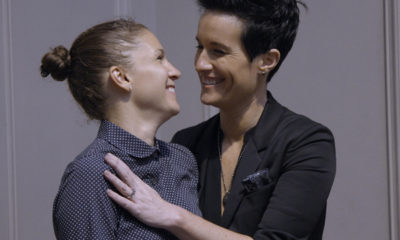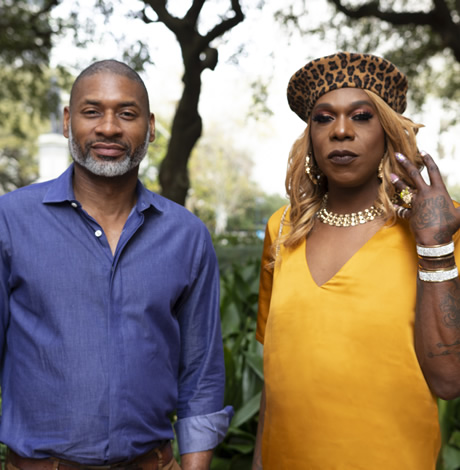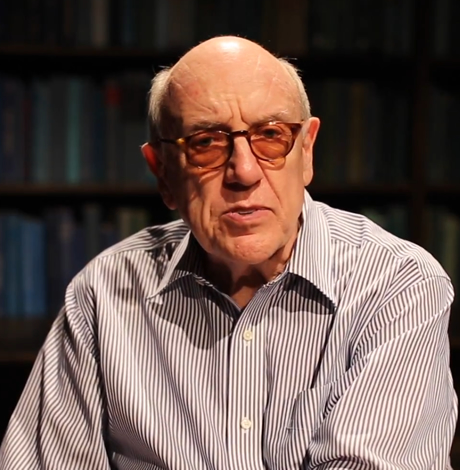Arts & Entertainment
‘Dog Day’ docs
Several LGBT themes explored in this year’s films
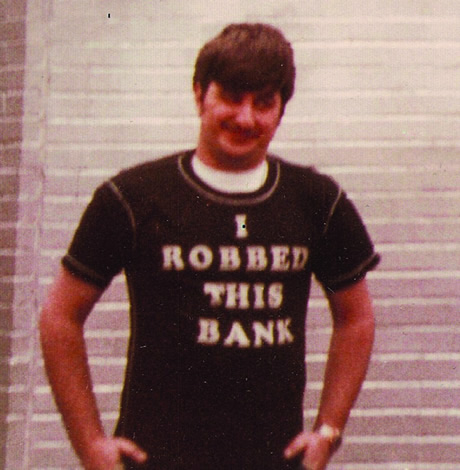
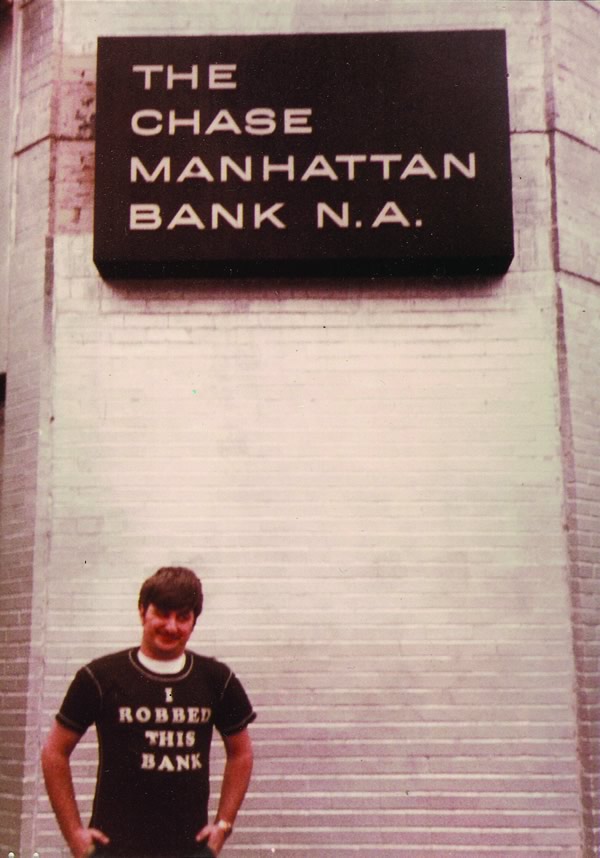
A still from ‘The Dog,’ a documentary that explores the life of John Wojtowicz, portrayed by Al Painco in the 1975 film ‘Dog Day Afternoon.’ (Photo courtesy AFI Docs)
The inspiring true story behind “Dog Day Afternoon,” a look at Greg Louganis’ life now, a con man who marries his partner in Washington — all are explored in documentaries slated for AFI Docs in the coming days.
This annual documentary film festival starts Wednesday and runs through June 22 at various venues in the D.C. area with screenings of several LGBT-themed films. Individual ticket prices range from $11-14. Tickets for the opening night screening and reception are $75.
The documentary film festival will screen 50 feature films and 21 short films. Four films are world premieres, two U.S. premieres and several East Coast premieres. The five-day festival is a popular event in the D.C. area with approximately 19,000 attendees last year. Full details on tickets, screen times and more are at afi.com/afidocs.
One of these 50 feature films screening is “The Dog,” directed by Allison Berg and Frank Keraudren. The piece delves into the true events of the classic 1975 film “Dog Day Afternoon,” which tells the story of John Wojtowicz, a man who robs a bank to pay for his partner’s sexual reassignment surgery.
The documentary interviews the real-life John Wojtowicz, played by Al Pacino in the 1975 film, and uses archival footage to capture New York City’s LGBT liberation movement of the 1970s. It screens Thursday at 3:45 p.m. and June 22 at 9 p.m. at the AFI Silver Theatre (8633 Colesville Rd., Silver Spring, Md.).
“We call this film a fucked up Forrest Gump story,” Berg says. “Wojtowicz is even more outrageous than the character Al Pacino played.”
Berg and Keraundren believe the documentary both examines Wojtowicz as a person and looks at America’s culture in the 1960s and 1970s in a different way.
“We truly unearthed footage that no one had seen,” Keraundren says. “We wanted to put this story in context. What we found was extraordinary.”
Berg and Keraundren say they didn’t begin making the documentary with a particular topic in mind. However, after meeting Wojtowicz in person they realized they had found something special.
“He was larger than life the second we met him,” Keraundren says. “The human aspect drew us in. It spoke to us and we thought it would speak to other people.”
Andrea Passafiume, festival programmer, thinks documentaries speak to people because of the human aspect.
“Truth is stranger than fiction,” Passafiume says. “It’s simple, compelling storytelling. Documentaries aren’t filled with special effects and CGI storytelling. It’s a simple human moment.”
“Back on Board,” another film on the schedule, tells the story of Olympic athlete Greg Louganis, the first male athlete to win diving events in consecutive Olympic games. Along with his Olympic career, Louganis is also gay and the film chronicles his private life, including his marriage to his partner. The film screens June 20 at 4:45 p.m. in the Portrait Gallery (8th and F streets, N.W.) and June 21 at 1:45 p.m. at the AFI Silver Theatre.
“An Honest Liar” documents illusionist James “The Amazin” Randi and how he mastered the art of illusion to entertain audiences and now uses his knowledge to expose con artists and psychics. The film also follows Randi as he marries his longtime partner in Washington. It screens June 20 at 4:30 p.m. in Goethe-Institut (812 7th St., N.W.) and June 21 at 9:30 p.m. at the AFI Silver Theatre.
Having a group of LGBT-themed documentaries to screen is something Passafiume says she likes to include.
“It makes me happy to have some LGBT films. I look at the program and say, ’Is this balanced?’ But there are a couple films where it’s not the primary theme.”
“112 Weddings” is one such film. It follows a filmmaker as he checks in with various married couples whose weddings he filmed over the years. One couple is lesbian.
Passafiume says films aren’t chosen specifically because they need to have a certain number of types or subjects in one category. She says thought-provoking and entertaining are the key elements she looks for.
“We select anything that has a way of telling a story in a different way that we haven’t heard before,” Passafiume says. “Marriage equality is a very topical thing. Greg (Louganis) has done incredible things as an athlete. But what happens after that?”
Berg says documentaries offer something that narrative film doesn’t — storytelling that’s real and hasn’t been dramatized.
“There are some things you just can’t make up.”
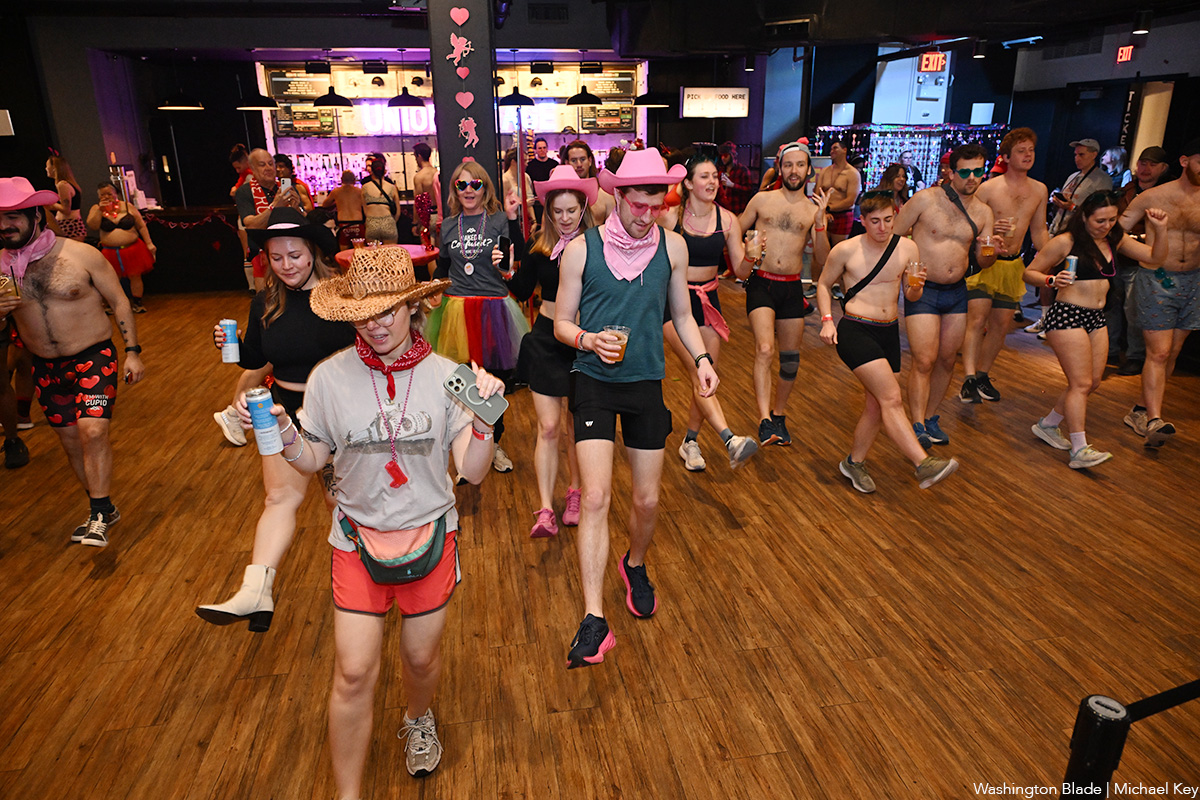
Cupid’s Undie Run, an annual fundraiser for neurofibromatosis (NF) research, was held at Union Stage and at The Wharf DC on Saturday, Feb. 21.
(Washington Blade photos by Michael Key)
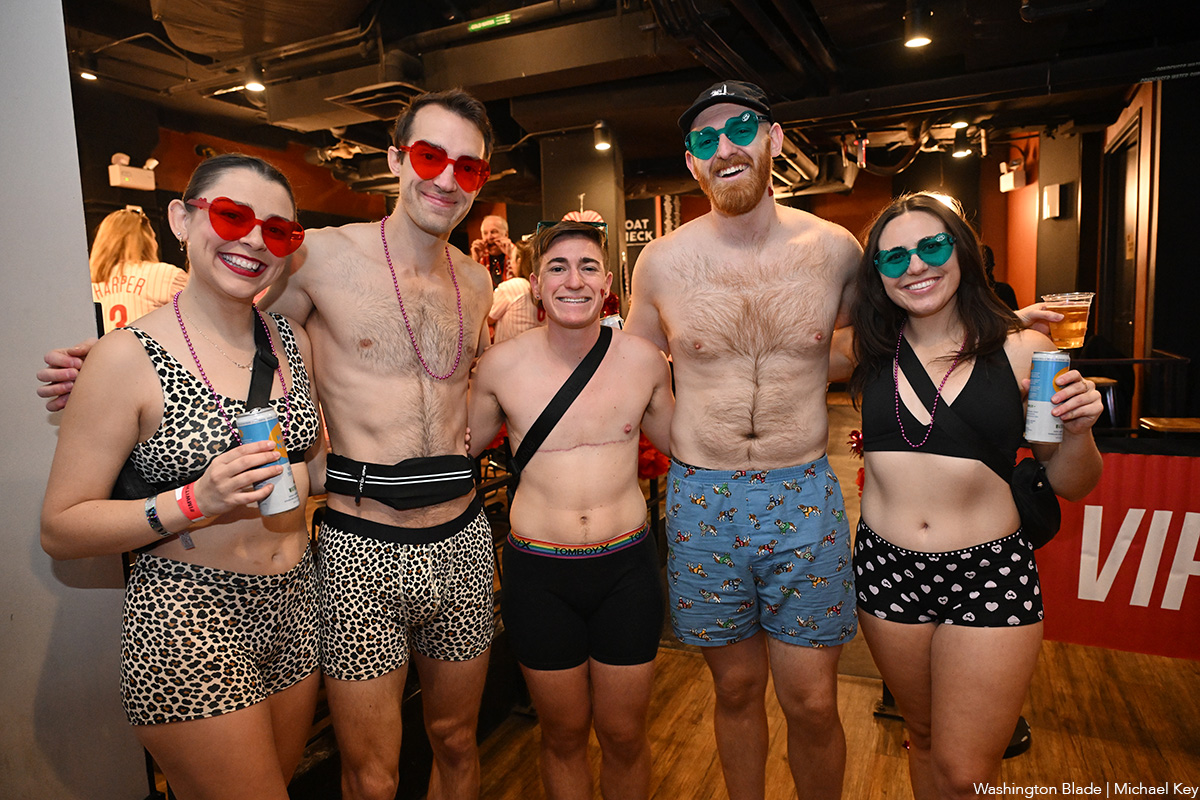
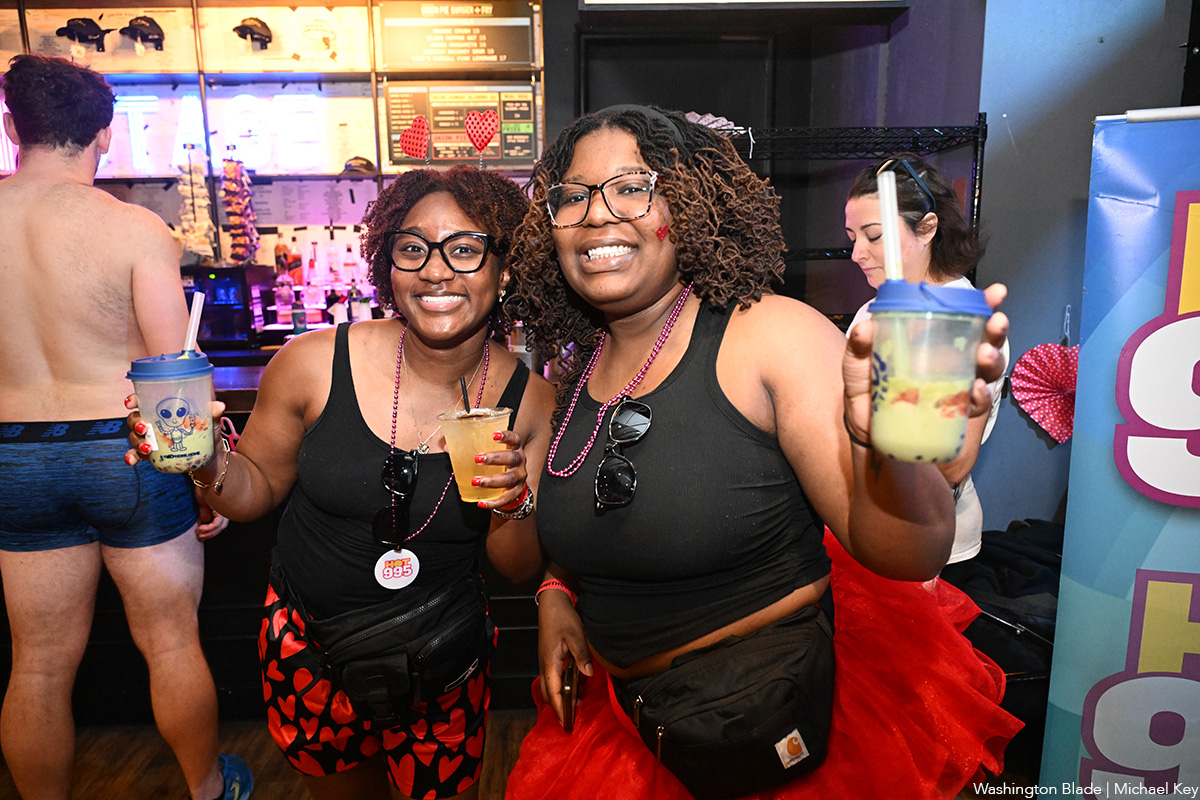
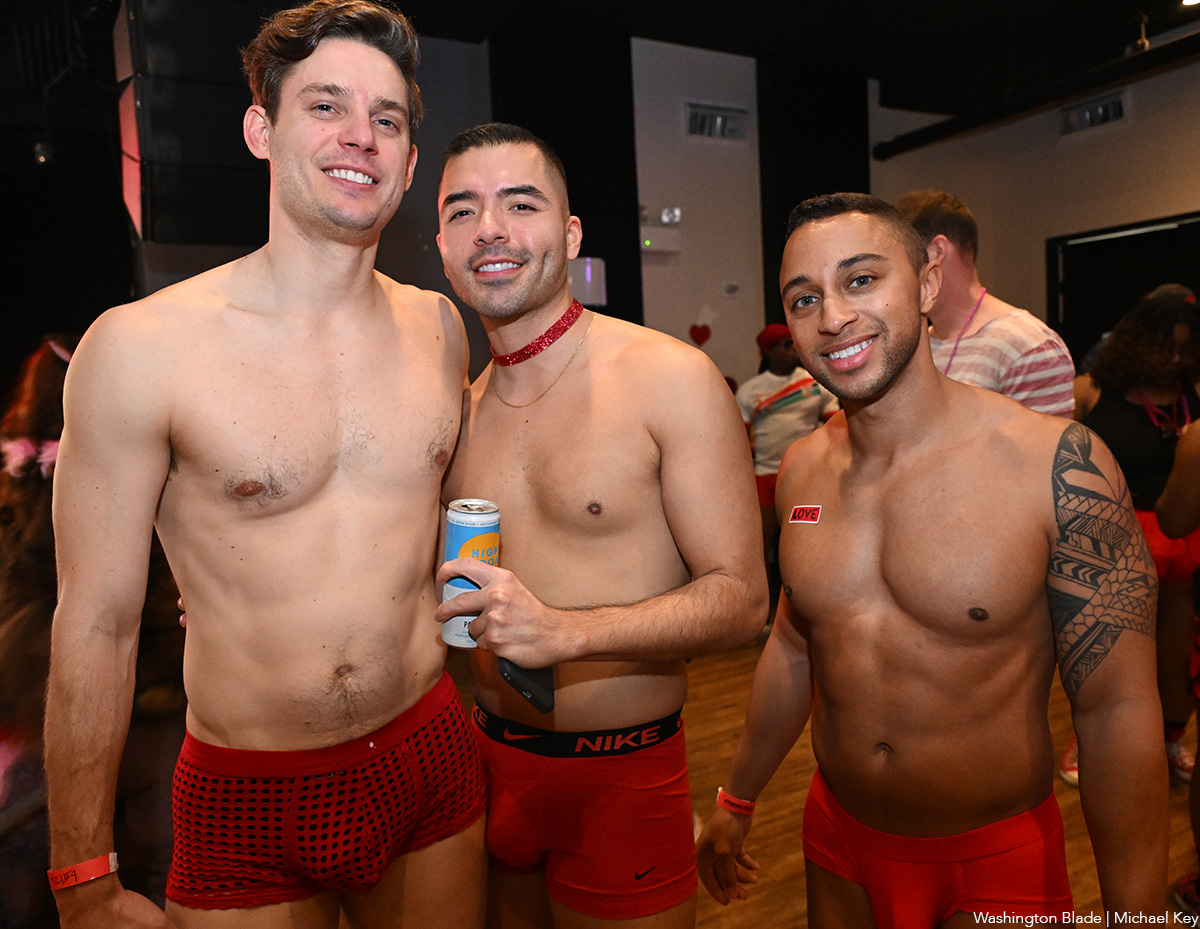
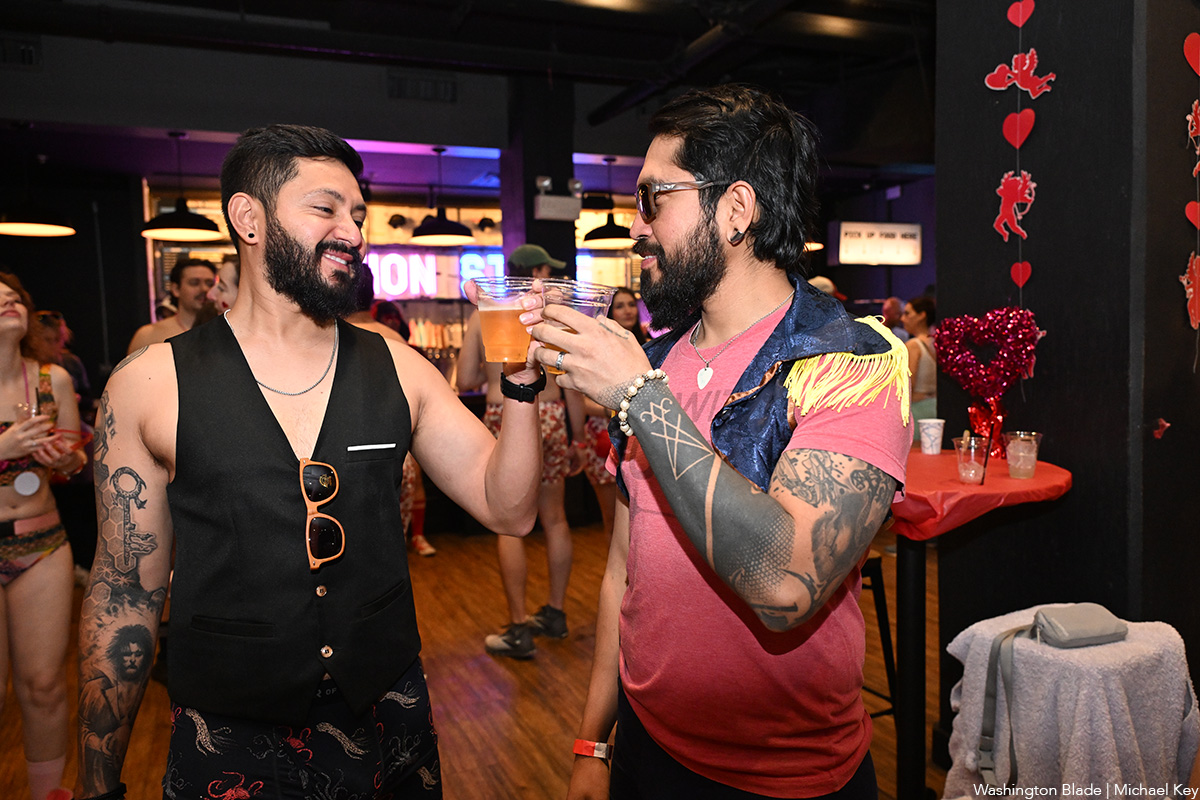
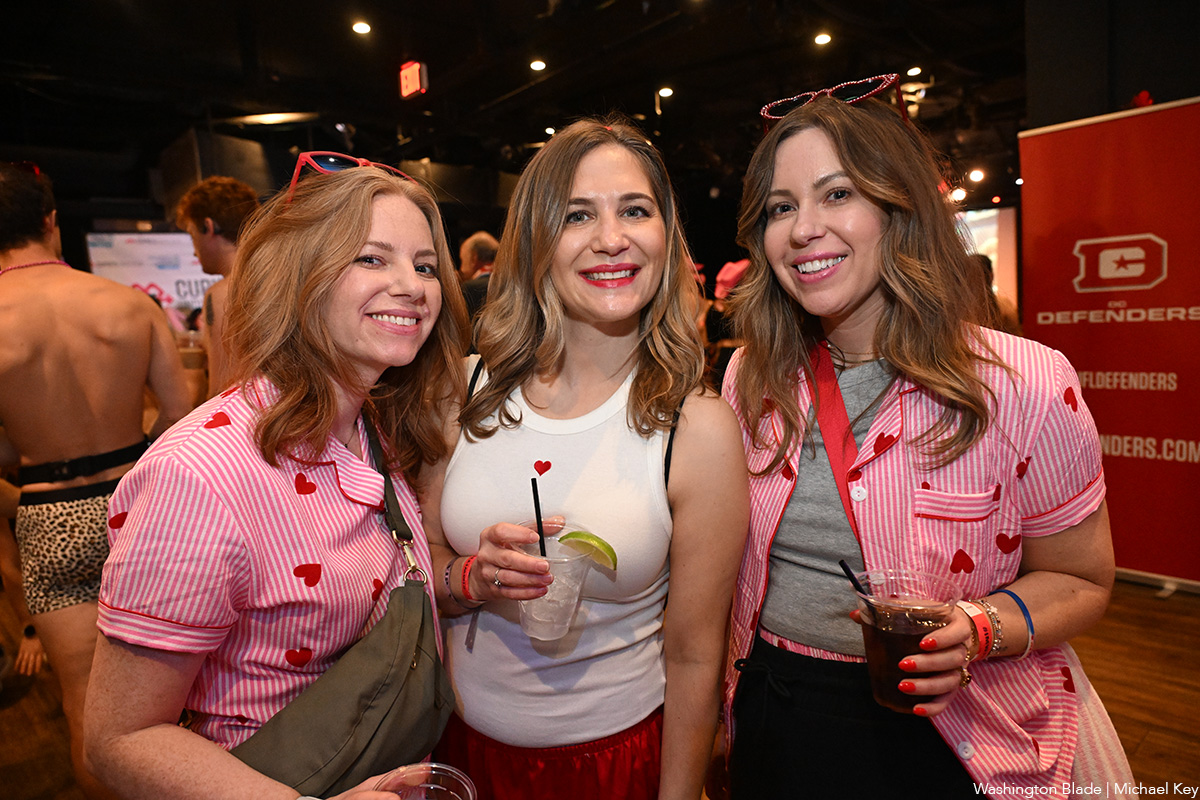
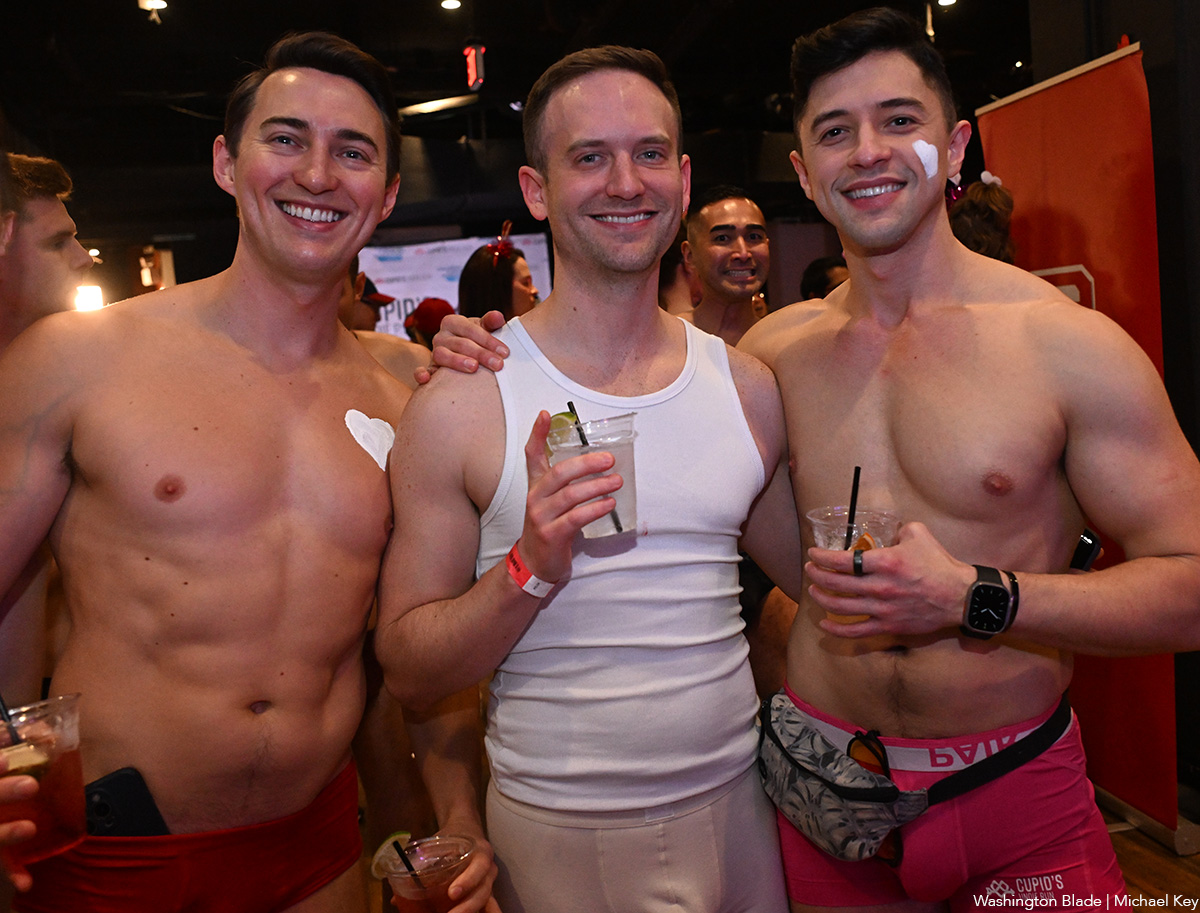
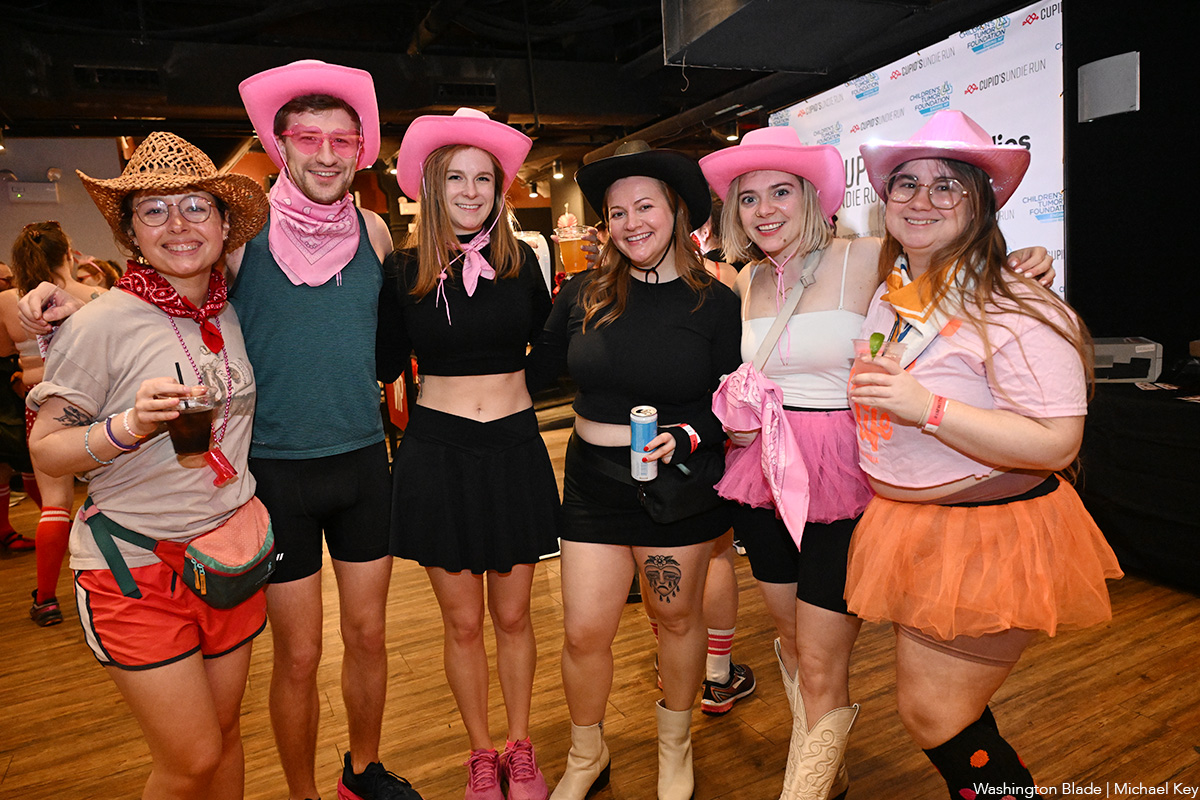
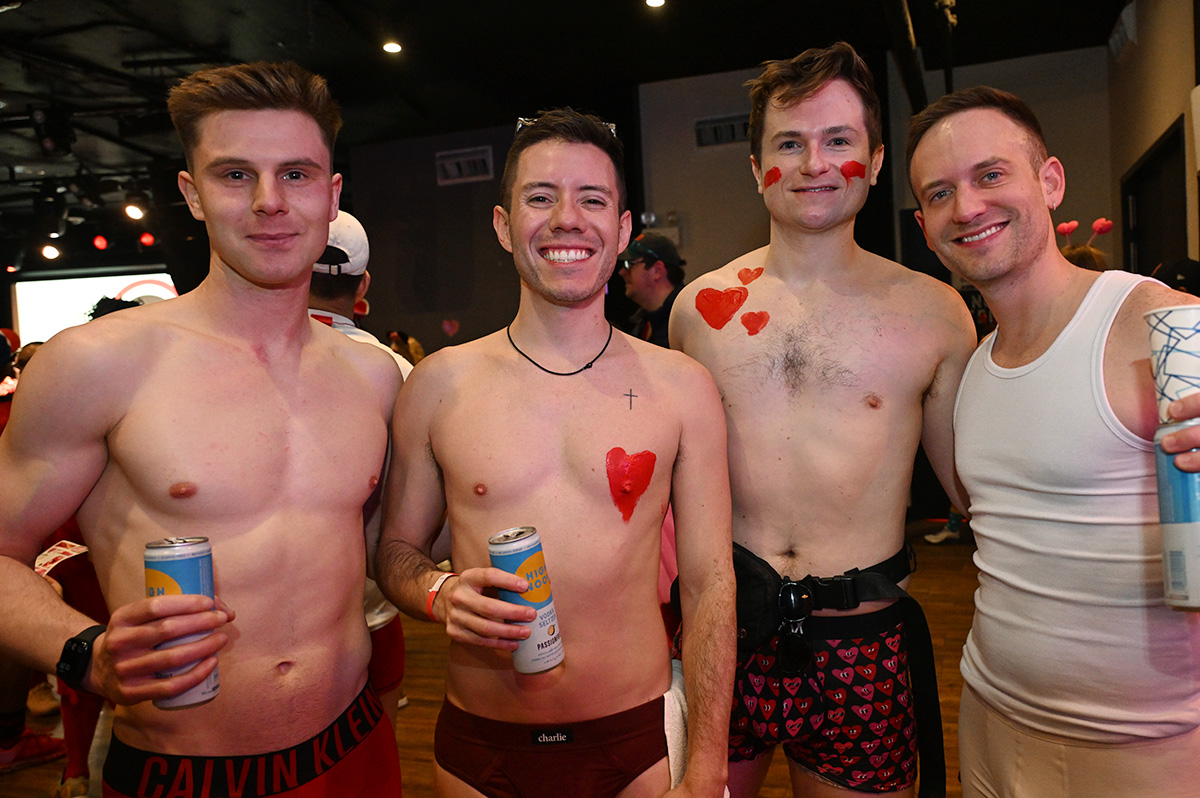
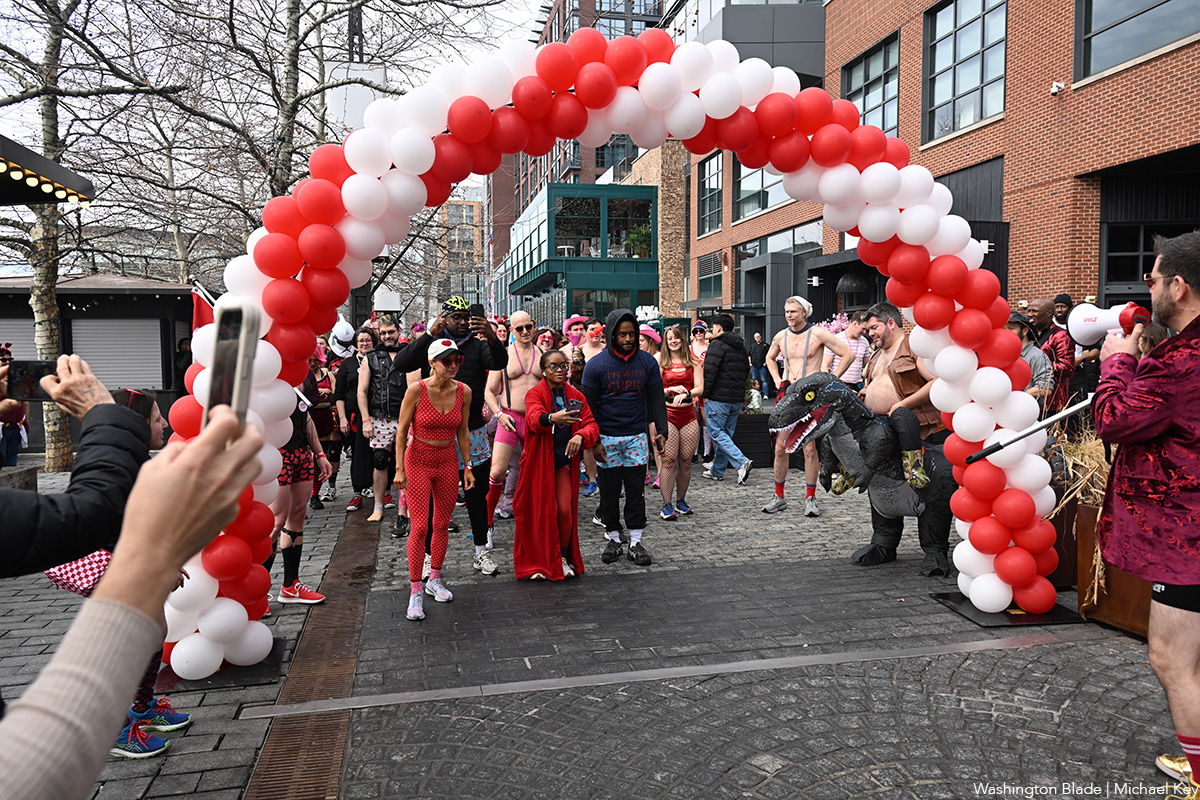
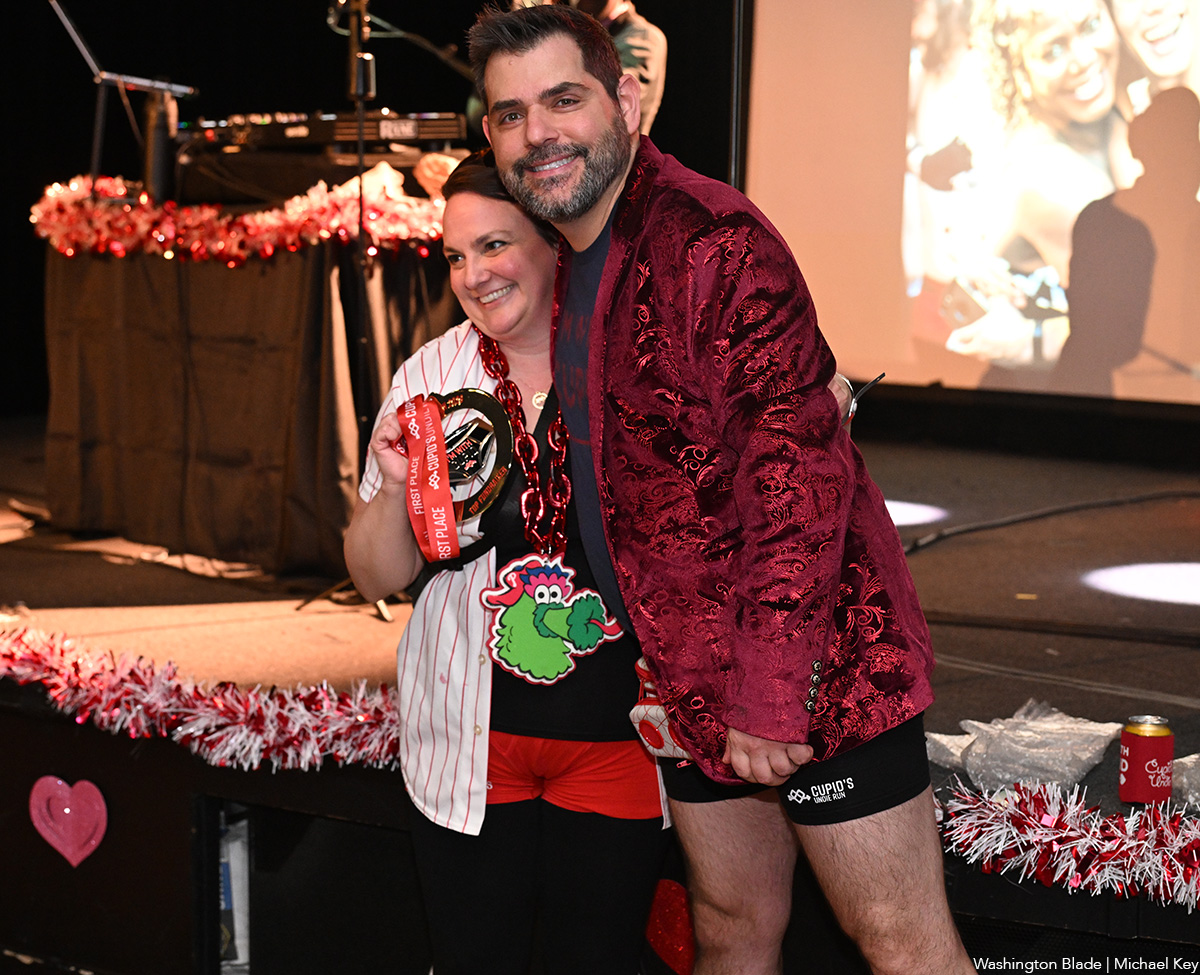
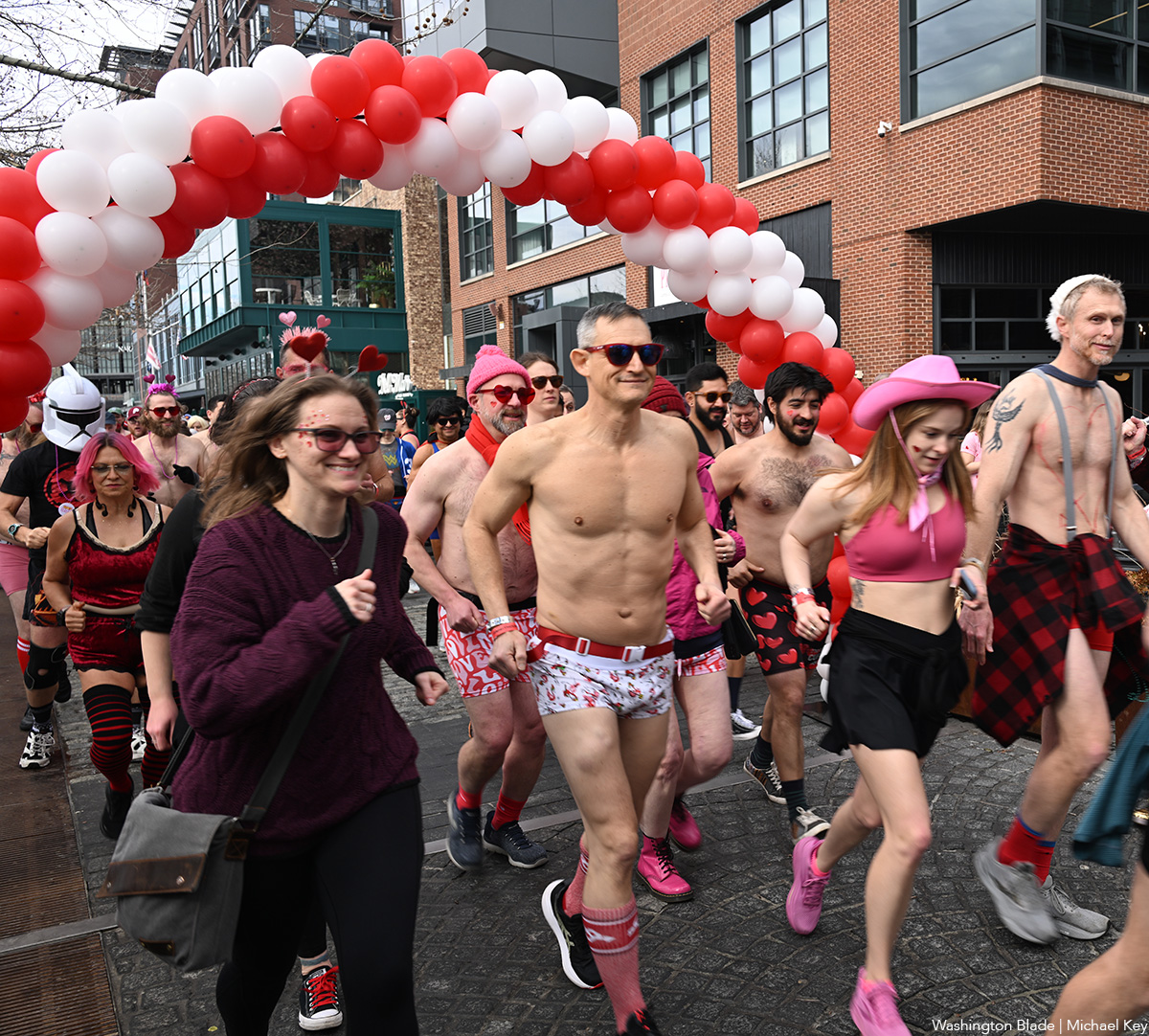
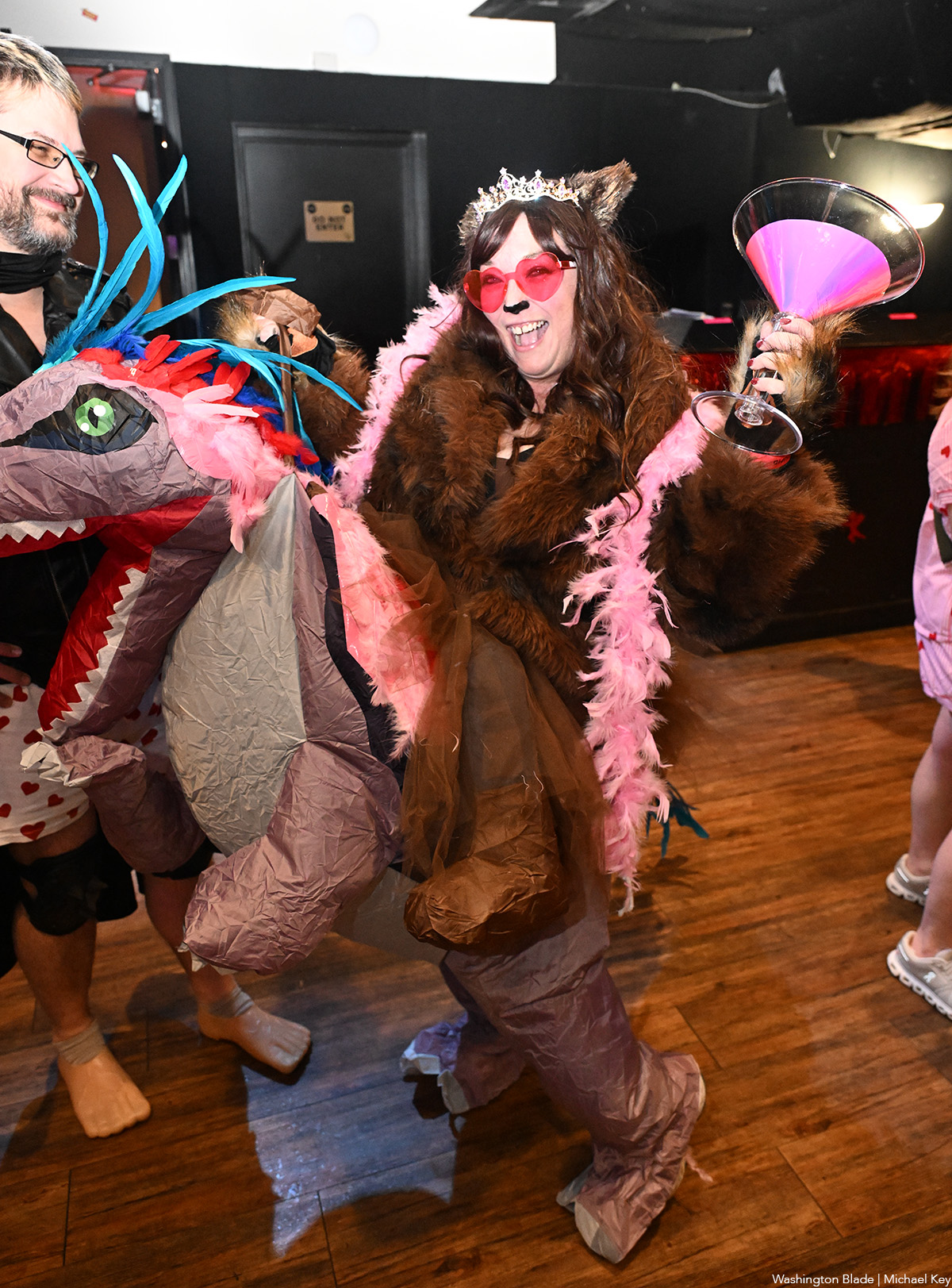
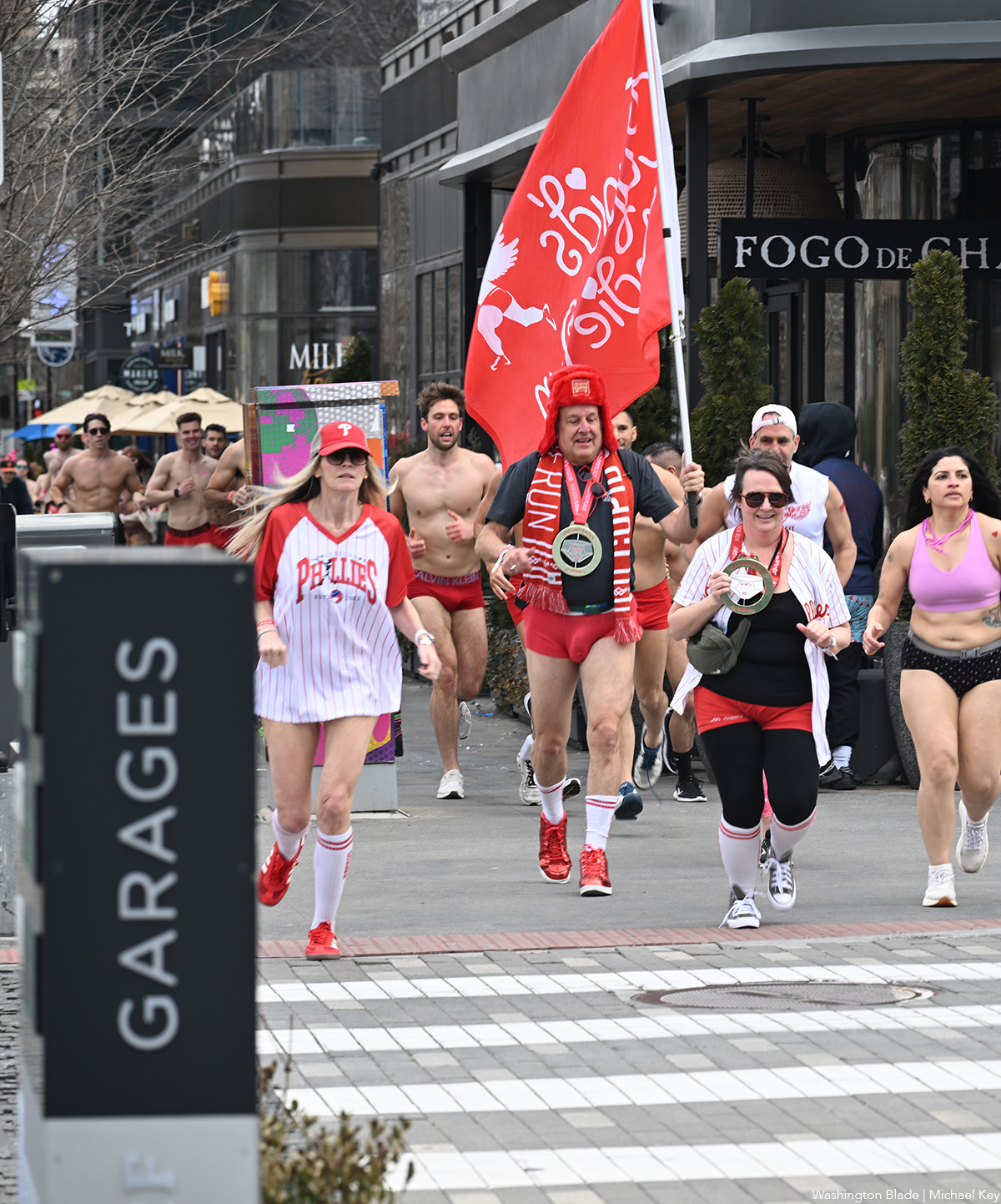

Sweat DC is officially expanding to Shaw, opening a new location at 1818 7th St., N.W., on Saturday, March 28 — and they’re kicking things off with a high-energy, community-first launch event.
To celebrate, Sweat DC is hosting Sweat Fest, a free community workout and social on Saturday, March 14, at 10 a.m. at the historic Howard Theatre. The event features a group fitness class, live DJ, local food and wellness partners, and a mission-driven partnership with the Open Goal Project, which works to expand access to youth soccer for players from marginalized communities.
For more details, visit Sweat DC’s website and reserve a spot on Eventbrite.

Friday, Feb. 20
Center Aging Monthly Luncheon with Yoga will be at noon at the D.C. LGBTQ+ Community Center. Email Mac at [email protected] if you require ASL interpreter assistance, have any dietary restrictions, or questions about this event.
Trans and Genderqueer Game Night will be at 7 p.m. at the D.C. Center. This will be a relaxing, laid-back evening of games and fun. All are welcome! We’ll have card and board games on hand. Feel free to bring your own games to share. For more details, visit the Center’s website.
Go Gay DC will host “First Friday LGBTQ+ Community Social” at 7 p.m. at Hotel Zena. This is a chance to relax, make new friends, and enjoy happy hour specials at this classic retro venue. Attendance is free and more details are available on Eventbrite.
Saturday, Feb. 21
Go Gay DC will host “LGBTQ+ Community Brunch” at 11 a.m. at Freddie’s Beach Bar & Restaurant. This fun weekly event brings the DMV area LGBTQ community, including allies, together for delicious food and conversation. Attendance is free and more details are available on Eventbrite.
LGBTQ People of Color will be at 7 p.m. on Zoom. This peer support group is an outlet for LGBTQ People of Color to come together and talk about anything affecting them in a space that strives to be safe and judgement free. There are all sorts of activities like watching movies, poetry events, storytelling, and just hanging out with others. For more information and events, visit thedccenter.org/poc or facebook.com/centerpoc.
Sunday, Feb. 22
Queer Talk DC will host “The Black Gay Flea Market” at 1 p.m. at Doubles in Petworth. There will be more than 15 Black queer vendors from all over the DMV in one spot. The event’s organizers have reserved the large back patio for all vendors, and the speak easy for bar service, which will be serving curated cocktails made just for the event (cash bar.) DJ Fay and DJ Jam 2x will be spinning the entire event. For more details, visit Eventbrite.
Monday, Feb. 23
“Center Aging: Monday Coffee Klatch” will be at 10 a.m. on Zoom. This is a social hour for older LGBTQ adults. Guests are encouraged to bring a beverage of choice. For more information, contact Adam at [email protected].
Tuesday, Feb. 24
Coming Out Discussion Group will be at 7 p.m. on Zoom. This is a safe space to share experiences about coming out and discuss topics as it relates to doing so — by sharing struggles and victories the group allows those newly coming out and who have been out for a while to learn from others. For more details, visit the group’s Facebook.
Genderqueer DC will be at 7 p.m. on Zoom. This is a support group for people who identify outside of the gender binary, whether you’re bigender, agender, genderfluid, or just know that you’re not 100 percent cis. For more details, visit genderqueerdc.org or Facebook.
Wednesday, Feb. 25
Job Club will be at 6 p.m. on Zoom upon request. This is a weekly job support program to help job entrants and seekers, including the long-term unemployed, improve self-confidence, motivation, resilience and productivity for effective job searches and networking — allowing participants to move away from being merely “applicants” toward being “candidates.” For more information, email [email protected] or visit thedccenter.org/careers.
Asexual and Aromantic Group will meet at 7 p.m. on Zoom. This is a space where people who are questioning this aspect of their identity or those who identify as asexual and/or aromantic can come together, share stories and experiences, and discuss various topics. For more details, email [email protected].
Thursday, Feb. 26
The DC Center’s Fresh Produce Program will be held all day at the DC Center. To be more fair with who is receiving boxes, the program is moving to a lottery system. People will be informed on Wednesday at 5 p.m. if they are picked to receive a produce box. No proof of residency or income is required. For more information, email [email protected] or call 202-682-2245.
Virtual Yoga Class will be at 7 p.m. on Zoom. This free weekly class is a combination of yoga, breathwork and meditation that allows LGBTQ community members to continue their healing journey with somatic and mindfulness practices. For more details, visit the DC Center’s website.

